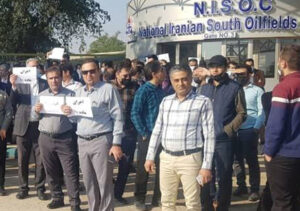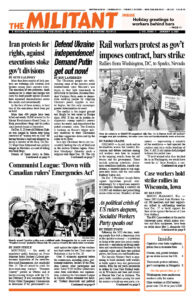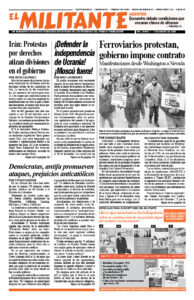
More than three months of daily protests are widening rifts between rival factions among Iran’s capitalist rulers. The execution of two protesters, death sentences for 11 others and charges that carry the death penalty against six more have expanded demonstrations across the country and internationally.
In the face of these actions, at least two of the executions have been put on hold.
More than 400 people have been killed and nearly 20,000 arrested by the Islamic Revolutionary Guard Corps, its Basij paramilitary thugs and the police since protests began in September.
On Dec. 8, 23-year-old Mohsen Shekari was hanged in Tehran after being convicted of “waging war on God” for having blocked a road and allegedly injuring a member of the Basij. On Dec. 12, Majid Reza Rahnavard was publicly hanged in Mashhad, accused of killing two Basij thugs.
Dozens of Sunni clerics in Baluchistan and Kurdistan and some Shia clerics have denounced the executions. Home to oppressed nationalities that face discrimination by the Shia-based bourgeois regime, both regions have been centers of some of the largest protests since Sept. 16. That’s when a young Kurdish woman, Mahsa — named Gina in Kurdish — Amini, died after she was arrested by the hated “morality” police in Tehran. The cops claimed she had violated the dress code imposed by the Islamic Republic.
Thousands demonstrated Dec. 16 in the two regions, calling for an end to the death penalty and government attacks on protests. In Zahedan, the largest city in Sistan-Baluchistan, which is one of the poorest and most rural parts of Iran, marchers carried signs calling for unity among “Baluch, Kurds, Turks, Lur, Persians, Bakhtiari, and Azerbaijanis” and for freedom for all the political prisoners.
Some 235 members of trade unions, the Iranian Writers’ Association, teachers, artists, poets and others signed a statement calling for an end to the death penalty. They noted that executions were used by the dictatorship of the shah of Iran prior to the 1979 revolution.
Thirteen political prisoners at the infamous Evin prison in Tehran issued a statement saying officials of the Islamic Republic live under the “delusion” that “the protests can be extinguished by resorting to naked violence.”
Three days of protests against the executions starting Dec. 19 included small businesses that closed up shop in many cities, especially in the Kurdish region in the northwest, and a strike by port workers at the Qeshm oil terminal in the south. According to a statement by the striking oil workers, they joined the action to raise their own economic demands and “to protest against the repression, executions and killings.”
Unions oppose death penalty
The Organizing Council of Oil Contract Workers reported that permanent workers held strikes Dec. 17 in at least seven oil complexes, focusing on wages, pensions and heath care. The union noted this was the first nationwide oil workers strike in decades.
The Oil Contract Workers union also called on temporary and permanent oil workers to join the protests against the executions, including by striking. In an earlier statement the union noted that the executions are “so heinous that even within the government itself there are quarrels.”
The government-financed Iranian Labour News Agency has almost no reports on strikes by oil workers, autoworkers, truck drivers and others over the last three months, but it ran two articles questioning the use of the death penalty.
While the most hard-line backers of Supreme Leader Ayatollah Ali Khamenei have called for accelerating the crackdown, the Labour News Agency ran an interview with Masoumeh Ebtekar, who was Iran’s first woman vice president in 1997. She said, “Harsh treatment cannot be the answer for young people who only want a better life.”
Ebtekar quoted former Iranian President Mohammad Khatami, a prominent representative of the “reformist” faction of the capitalist class, saying that overthrow of the Islamic Republic, demanded by some protesters, “is neither possible nor desirable.”
‘With or without hijab’
Differentiating herself from the hardliners who say that if women don’t conform to the mandatory dress code they are walking around “naked,” Ebtekar notes that mothers love their daughters “with and without hijab.”
The Labour News Agency also published criticisms of the government’s violation of constitutional rights, including an interview with Ismail Beigi, the lawyer for Samin Yasin, a Kurdish rap artist who could face the death penalty. He sings about economic hardships, inequality, corruption and the morality police.
Even though the Iranian Constitution guarantees defendants the right to an attorney of their choosing, the court would not allow Beigi to represent Yasin. Beigi noted that the main “evidence” against Yasin is “a blurred video” allegedly of someone setting a garbage bin on fire and shooting a gun in the air.
Truck drivers strike
The protests take place amid the deepening capitalist economic crisis, exacerbated by the deadly cost of the bourgeois clerical regime’s decadeslong military adventures in Syria, Lebanon, Yemen, Iraq and beyond. The crisis is intensified by U.S. and allied sanctions imposed to put pressure on Tehran for its nuclear weapons program.
The National Union of Retirees reports that the annual rate of inflation for food hit 63.4% in November, which it says was never reached before, “not even during the occupation of the country in World War II” by British and Allied forces that led to 4 million deaths.
Independent owner-operator truck drivers waged a nearly two-week strike demanding fuel subsidies and rate increases in the face of the rising cost of fuel, tires and repairs.
“Look how you shook the lives of these thieves with a strike that was only in 19 provinces,” the Truckers and Drivers Union said. The government should watch out for “the day when we will all be together and go on strike in all 31 provinces.”
Meanwhile, a joint statement issued by the Chinese and Saudi Arabian governments Dec. 9 reflected Tehran’s diplomatic isolation. It followed a three-day visit to Saudi Arabia by Chinese President Xi Jinping.
Beijing is one of Iran’s main trading partners and Saudi Arabia is a key rival that works with Washington to try to block Tehran’s influence in the region. Their declaration put forward demands that contradict Iranian government positions. It called for negotiations over the status of three islands in the Strait of Hormuz, claimed by both the United Arab Emirates and Tehran, and for ensuring that Iran’s nuclear program doesn’t lead to the government developing nuclear weapons. The declaration reiterated support for both an Israeli and a Palestinian state, countering Tehran’s call for the destruction of Israel.

